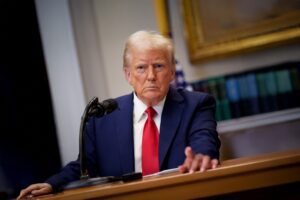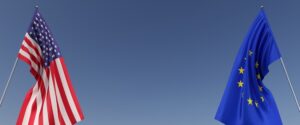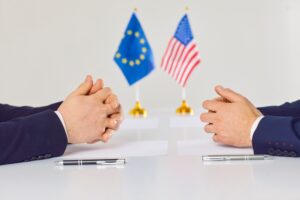WITA’s Friday Exchange Podcast: The Trade Reporters on Trump’s Tariffs, Truths, and Trade
This week, WITA welcomes The Trade Reporters to the Exchange Podcast.
Most weeks, we invite in former trade negotiators to update our viewers and listeners on U.S. and global trade policy. This week, we turned the camera around to ask our guests what is it like to report on trade in Trump 2? Our guests discussed what they are hearing as they talk to policy makers, business leaders, foreign leaders, trade officials and everyday people impacted by the President’s trade initiatives.
Featured Speakers:
Introduction: Kenneth Levinson, CEO, Washington International Trade Association
Shawn Donnan, Senior Writer, Bloomberg; former World Trade Editor, Financial Times
David Lynch, Global Economics Correspondent, Washington Post; and the author of the new book The World’s Worst Bet: How the Globalization Gamble Went Wrong (And What Would Make It Right)
Ana Swanson, Trade and International Economics Correspondent, The New York Times; former Staff Writer, Washington Post, covering the economy, trade and the Federal Reserve
Moderator: Wendy Cutler, Senior Vice President, Asia Society Policy Institute; former Acting Deputy U.S. Trade Representative, Office U.S. Trade Representative
Trump’s Method is Not Madness

Deliberate disruption and manufactured tensions have proven surprisingly effective in advancing US interests across multiple fronts.
Critics of Donald Trump’s policies, and that includes almost everyone with a voice in public space, have created an echo chamber powerful enough to drown out any counter-opinion. Yet, the question remains an interesting one – is there a method in Trump’s madness? Paulo Coelho’s words remind us about the pitfall of being a slave to expected behaviour, “If someone isn’t what others want them to be, the others become angry.” Fear and helplessness are the usual creators of anger. What is Trump threatening and what makes his detractors feel helpless?
Trump is using the tactic of “creating a crisis to solve a problem” to handle intractable issues. Starting a war is part of this strategy; wars, including economic wars, enlarge the sphere of permitted actions beyond what is allowed in peacetime.
Joe Biden imposed sanctions on Russia when it invaded Ukraine. These sanctions were ineffective against the Russian economy or its war efforts because of weapons support from Iran and North Korea, technological and trade support from China, and oil imports by India. The Ukraine war drifted into a war of attrition draining US and European resources. It benefited China in every possible way, from taking a dominant position in Sino-Russian relationship to creating a rift in NATO as well as a trust deficit between the United States and the European Union. Trump’s policies have pushed NATO nations to agree to a defence budget increase while China, after a bout of tariffs and counter-tariffs, is back to negotiations with the United States.
Or take the case of India. Successive US presidents watched helplessly as India maintained its barriers on imports from the United States while enjoying the US markets for its exports, resulting in huge trade imbalance. Trump got an opportunity to create a trade crisis when India dramatically increased imports of Russian oil, ignoring US sanctions. For Trump, the apparent crisis in Indo-US relations may be the means for confronting head-on the old policy of ignoring the differential trade policies of the two democracies towards each other.
08/28/2025 | R. N. Prasher | Lowy Institute
Turnberry: A Turning Point for EU–US Trade

The EU-US trade agreement, agreed two weeks ago in Turnberry, Scotland, continues to attract both attention and criticism. As a reminder, this “political framework” commits the two sides to change their tariff regimes, launches a dialogue on standards and safety for industrial and agricultural products, hints at working together to roll back global steel over capacity and includes an EU promise – very carefully worded – to buy more US weapons and fossil fuels, and invest at least US$600bn in US manufacturing in the next years. It is not legally binding on either party.
Despite the brave face put on it by President von der Leyen – “strong if not perfect” is how she described it in a series of op-eds over the weekend – most commentators rightly regard the deal as deeply flawed and a reflection of Europe’s waning international influence. Mario Draghi is the latest to say as much. You can always tell if a deal is shoddy if the words ‘fair’ or ‘balanced’ appear in the title. Both do.
The framework is decidedly not a trade agreement of the kind we are used to. It is a statement of intentions, a commitment to try to do certain things – invest more, buy more if the private sector chooses. Among its few hard commitments are the US imposition of a 15% standard tariff on EU exports; and the EU’s ‘reciprocal’ commitment to remove duties on all industrial goods and offer preferences to the US on a wide range of agricultural products, including sensitive ones like pigmeat and dairy.
The EU has been criticised for giving preferences to US agriculture alone. To do so is illegal under the World Trade Organisation’s laws that the EU has always defended. Article 1 of the General Agreement on Tariffs and Trade (GATT) – the Most Favoured Nation (MFN) clause – states that any tariff concession offered to one country must be extended unconditionally to all other WTO members. One cannot extend trade concessions to just one country, outside of a Free Trade Agreement. The rule was designed specifically to prevent the kind of unilateral bullying that the EU was subject to in recent weeks.
It was unclear until now if the EU’s commitment to remove duties on all industrial goods – representing 95% of trade with the US – would be preferential or MFN. However, this writer got confirmation from a senior Commission trade official over the weekend that the tariff removal will also be for the benefit of the US alone. My ex-colleague said to me: “It’s only for the US, forget MFN….just unbelievable!”
08/27/2025 | John Alistair Clarke | Friends of Europe
Who Really Wins In the US-EU Trade Deal?

So, who “wins” in the US-EU agreement? Many see the EU as the clear loser, since the US clearly managed to use its hegemonic power to extract favorable terms. But this power rests on the strength of the US economy, which Trump’s policies – unsustainable deficits, cuts to scientific research, attacks on central-bank independence, immigration restrictions, handouts to the fossil-fuel industry – are quickly subverting. Moreover, in the short run, the tariffs will raise prices for US consumers and increase costs for US producers (including foreign investors in the US), slowing the economy. The resulting disruption in global trade will raise prices and slow growth in the EU, too, but by considerably less.
The EU faced a choice. It could pursue a costly trade war or agree to “the best deal we could get under very difficult circumstances” – circumstances that included an implicit US threat to withdraw support from NATO. The EU can counter the negative effects of the tariffs by diversifying its trading partners and negotiating new trade agreements with them. US tariffs are already encouraging closer trading relations with likeminded developed countries like Australia, Canada, Japan, and South Korea. They may also lend momentum to trade talks between the EU and Latin America’s Mercosur bloc, as well as with ASEAN “connector” economies that are critical to global supply chains. And finally, by sabotaging transatlantic cooperation on China, Trump has given the EU an opening to fashion its own trade and investment agreements with the world’s second-largest economy.
The EU has always been strengthened through crises. The necessary, second-best trade deal with the US should not undermine its main goal: achieving “open strategic autonomy” with an integrated defense industrial base, a differentiated trade profile that reflects its commitment to multilateralism, and policies to promote sustainable competitiveness and innovation, especially in high-tech industries where the EU lags both the US and China. If Europe succeeds, it will emerge as a major pro-democracy and pro-market leader in a multi-polar world.
08/22/2025 | Laura Tyson & George Papaconstantinou | PubAffairs Bruxelles
WITA – We put the community in trade community.
Information about upcoming WITA and trade community events



